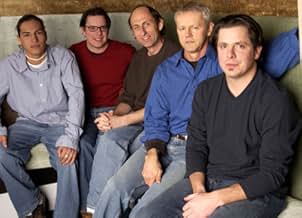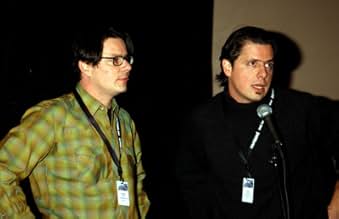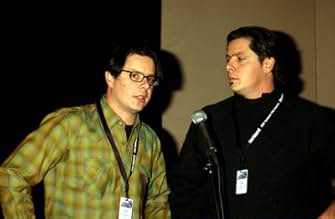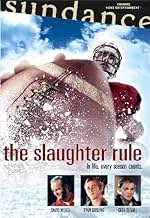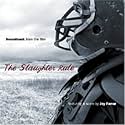IMDb रेटिंग
5.9/10
2.8 हज़ार
आपकी रेटिंग
अपनी भाषा में प्लॉट जोड़ेंA young man finds solace with a young woman, his mother, and a high-school football coach who recruits him to quarterback a six-man team.A young man finds solace with a young woman, his mother, and a high-school football coach who recruits him to quarterback a six-man team.A young man finds solace with a young woman, his mother, and a high-school football coach who recruits him to quarterback a six-man team.
- निर्देशक
- लेखक
- स्टार
- पुरस्कार
- 2 जीत और कुल 2 नामांकन
John Henry Marshall
- Matt Kibbs
- (as John Henry Marshall III)
फ़ीचर्ड समीक्षाएं
I must have been standing next the to the last reviewer in the hallway (at the Park City Library) at Sundance. Morse walked by along with the directors. I managed to corral Andrew Smith and ask him about the movie. (These directors LOVE to talk about their work.)
First of all, this is not a great movie, and may never be fit for the mass market. But it is, I think, a good movie and a very powerful and thought-provoking one. My initial reaction, which I passed onto Smith, was that I was moved by the internal conflict in this unusual coming-of-age story. What kind of man is Gosling going to become? How will he deal not just with the peer pressures and love interests, but with societal prejudices and the essence of humanity, compassion and kindness. Interestingly, I learned that an early tagline considered for the film was something like "What makes a man?"
David Morse's performance is absolutely incredible in this movie. I spoke to a film critic about it and he said he thought Morse was the best American actor that no one has heard of. It is an extremely challenging and enigmatic role that he plays with a poignant, compelling and believable complexity. I was at the same time deeply moved, repulsed, angered and sympathetic. I was reminded that there is good and bad in all of us, and that the demons within are part of the essence of humanity.
Maybe too deep and philosophical for a movie about 8-man football. And that's just it--it's a situational contrast that's unexpected and jarring. If you ever get a chance to see this film, grab it.
First of all, this is not a great movie, and may never be fit for the mass market. But it is, I think, a good movie and a very powerful and thought-provoking one. My initial reaction, which I passed onto Smith, was that I was moved by the internal conflict in this unusual coming-of-age story. What kind of man is Gosling going to become? How will he deal not just with the peer pressures and love interests, but with societal prejudices and the essence of humanity, compassion and kindness. Interestingly, I learned that an early tagline considered for the film was something like "What makes a man?"
David Morse's performance is absolutely incredible in this movie. I spoke to a film critic about it and he said he thought Morse was the best American actor that no one has heard of. It is an extremely challenging and enigmatic role that he plays with a poignant, compelling and believable complexity. I was at the same time deeply moved, repulsed, angered and sympathetic. I was reminded that there is good and bad in all of us, and that the demons within are part of the essence of humanity.
Maybe too deep and philosophical for a movie about 8-man football. And that's just it--it's a situational contrast that's unexpected and jarring. If you ever get a chance to see this film, grab it.
9B24
As a subscriber to Sundance Channel, I am intrigued by recurrent programming patterns in the films shown. Recently, for example, there has been a spate of male-oriented psycho-sexual dramas that go deeply into themes usually represented in mainstream cinema as subconscious or accidental phenomena.
In The Slaughter Rule as well as other recent offerings like L.I.E. or Priest or Taboo (originally Gohatto), characters reveal emotions that seem designed specifically to break new ground in the amorphic area between ordinary storytelling and what some would call pornography. The common word to describe this is "disturbing." But just as Who's Afraid of Virginia Woolf, Midnight Cowboy, and Harold and Maude opened people's eyes in the 60's and 70's to the possibilities of "disturbing" cinema as literature, these new films may lead in my view to an entirely new public attitude about the inherent validity of the effort.
To be sure, The Slaughter Rule is a flawed film. So are many others of its kind to date. Its premise, however, is sound. One can nitpick about cinematic values, geographical anomalies, or plot distractions, etc., but to be able to see disparate fictional characters get under each other's skin is what makes any drama come to life. Added to that in this case is a very competent job of producing, directing, and editing. Moreover, no one can quarrel with the acting performance of David Morse.
Coming to grips with overtly sexual themes in films -- particularly those that deal seriously with "disturbing" but very real kinds of human emotions -- is a challenging task not only for moviemakers like the Smiths, but also for viewers. I give this movie an "E" for effort and a solid 9 out of 10 for everything else.
In The Slaughter Rule as well as other recent offerings like L.I.E. or Priest or Taboo (originally Gohatto), characters reveal emotions that seem designed specifically to break new ground in the amorphic area between ordinary storytelling and what some would call pornography. The common word to describe this is "disturbing." But just as Who's Afraid of Virginia Woolf, Midnight Cowboy, and Harold and Maude opened people's eyes in the 60's and 70's to the possibilities of "disturbing" cinema as literature, these new films may lead in my view to an entirely new public attitude about the inherent validity of the effort.
To be sure, The Slaughter Rule is a flawed film. So are many others of its kind to date. Its premise, however, is sound. One can nitpick about cinematic values, geographical anomalies, or plot distractions, etc., but to be able to see disparate fictional characters get under each other's skin is what makes any drama come to life. Added to that in this case is a very competent job of producing, directing, and editing. Moreover, no one can quarrel with the acting performance of David Morse.
Coming to grips with overtly sexual themes in films -- particularly those that deal seriously with "disturbing" but very real kinds of human emotions -- is a challenging task not only for moviemakers like the Smiths, but also for viewers. I give this movie an "E" for effort and a solid 9 out of 10 for everything else.
Sometimes technical flaws can get in the way of what otherwise could have been a good story. These movie's flaws prevented me from enjoying it much.
First, two key deleted scenes from the start of the film leave the entire premise feeling hollow. The scenes are offered as a special feature on the DVD. If I were to watch this movie again, I'd play these two deleted scenes where they should have been. First, the scene deleted after the conversation about the teen's father that opens the movie. Second, just minutes later the continuation of a scene talking with the coach in his office.
This has been a growing trend, for directors to cut key scenes that explain things at the start of the movie. In at least commentary tracks directors have said they 'just wanted to get on with the movie'. Well of course they might, since they know the story intimately. The viewer won't, and could use the background to make an emotional connection to the movie. Unless the movie is past the two hour mark, why consider cutting valuable scenes?
Gosling and some of the other performances were great. Of course Gosling does great even in rotten movies like Murder By Numbers.
The wide screen was an overly wide aspect, I guess meant to highlight those beautiful outdoor scenes over the actors. It leaves barely enough room for actors' heads in places, and it made the brief shower scene no fun at all. To echo another comment, the sound was very poor in places. More than accents, it was bad mixing where sound jumped from soft whisphers to loud music then back. My finger ended up fiddling with the volume throughout.
In hindsight, I might watch The Slaughter Rule once, but it won't be worth watching even a second time.
First, two key deleted scenes from the start of the film leave the entire premise feeling hollow. The scenes are offered as a special feature on the DVD. If I were to watch this movie again, I'd play these two deleted scenes where they should have been. First, the scene deleted after the conversation about the teen's father that opens the movie. Second, just minutes later the continuation of a scene talking with the coach in his office.
This has been a growing trend, for directors to cut key scenes that explain things at the start of the movie. In at least commentary tracks directors have said they 'just wanted to get on with the movie'. Well of course they might, since they know the story intimately. The viewer won't, and could use the background to make an emotional connection to the movie. Unless the movie is past the two hour mark, why consider cutting valuable scenes?
Gosling and some of the other performances were great. Of course Gosling does great even in rotten movies like Murder By Numbers.
The wide screen was an overly wide aspect, I guess meant to highlight those beautiful outdoor scenes over the actors. It leaves barely enough room for actors' heads in places, and it made the brief shower scene no fun at all. To echo another comment, the sound was very poor in places. More than accents, it was bad mixing where sound jumped from soft whisphers to loud music then back. My finger ended up fiddling with the volume throughout.
In hindsight, I might watch The Slaughter Rule once, but it won't be worth watching even a second time.
The Slaughter Rule is one of the few unique films that captivates the viewer straight from the opening sequence. The film opens with a haunting shot, as twin brothers Alex and Andrew Smith take there camera through a barb-wire fence to reveal a helpless dying deer, literally struggling for its every last breath of life. Enter Roy Chutney, a high school student who is cut from the varsity football team just three days prior to losing his estranged father. Much like the deer, Roy never gives up in his struggle to live his life in wake of tragedy, even after losing just about everything that held meaning in his young adulthood. Roy is eventually approached by the local paper distributor Gideon (played with remarkable passion and sustain by the brilliant David Morse). Gideon asks Roy to join his roughneck 6-man football team. Upon joining, Roy is taken under Gideon's wing and must eventually confront the small-town rumors that linger regarding Gideons sexuality, and turbulent past. The Slaughter Rule is unlike any high school football movie ever made. First of all, the film omits any of the standard hallway and classroom scenes that frequent every other film of the genre, It also discards the glorified high school football stadiums that almost give the impression they could be home to the next super bowl. Instead the scenes in this film are mainly set in country bars, private bedrooms, and cold icy fields, where the viewer can almost feel themselves being slammed into the frozen tundra alongside the players themselves. Where most football movies feature strong, good-looking, "prom king" type players, The Slaughter Rule uses gritty, "normal-looking" kids, that could easily be seen tossing the pigskin around in any small middle American town. Eric Edwards stunning cinematography, and alt/country musician Jay Farrar's folk influenced score, help make The Slaughter Rule one of the most promising directorial debuts in recent years, and was by far the best film I saw at the 2002 Lake Placid Film Festival. I strongly urge anyone who has ever experienced loss from death or rejection, to watch this film. For those of you who have not, pull that letterman jacket out of the closet and rent Varsity Blues.
Jesse Haven is a 19 year old film student from Burlington, Vermont Questions or comments?? Email me
Jesse Haven is a 19 year old film student from Burlington, Vermont Questions or comments?? Email me
Despite the novelty of its setting, 'The Slaughter Rule' is a fairly conventional coming-of-age tale about a boy who grows into manhood by becoming a member of a ragtag six-man football team. Roy is a teenager trapped in a small Montana town whose life has not been going any too well of late. His father, with whom he had only the most casual of relationships, has been discovered dead on a railroad track, a possible suicide victim. His mother, embittered by their divorce, sleeps around with countless men and has no real inclination to provide her son with any but the most cursory form of maternal affection. On top of all this, Roy has just been rejected for the school's varsity football team because the coach finds him lacking in the kind of 'anger' he feels a player needs to be a success on the gridiron. When Roy is asked by Gid, a somewhat eccentric older man in the town, to come join his six-man football team, the youth only reluctantly acquiesces (six-man football is a near rule-less poor relation to the real game, one ostensibly only played by farm boys). It is at this point that Roy's growth into manhood begins, since it turns out that the enigmatic Gid, who one assumes will be merely a father figure for the affection-starved youth, may be seeking more than just a father/son, athlete/coach relationship with the boy.
This latent-homosexual subtext, in fact, is just about the only element that separates 'The Slaughter Rule' from countless other films in this genre. Most everything else about the film feels derivative and stale: the emotionally distant parents, the promiscuous, psychologically detached mother, the abusive stepdad, the sweet girl who wants to flee this hicksville town as fast and as far as a bus ticket can take her. Towards the end, especially, the filmmakers start to pile up the heartbreaks and tragedies, one on top of the other, almost to epic proportions. One wonders how so much can happen in so short a time to so small a group of people. In the almost two hour running time of the film, only the ambiguity of the Roy/Gid relationship arouses any real interest in the viewer.
Ryan Gosling is tremendously appealing as the troubled Roy, and David Morse (the father in 'Contact') turns Gid into a nicely sympathetic figure. The starkness of the Montana landscape also provides an appropriate backdrop for the bleak melodrama that is playing itself out in the foreground. Apart from these few quality elements, however, there isn't a whole lot else to commend in 'The Slaughter Rule.'
This latent-homosexual subtext, in fact, is just about the only element that separates 'The Slaughter Rule' from countless other films in this genre. Most everything else about the film feels derivative and stale: the emotionally distant parents, the promiscuous, psychologically detached mother, the abusive stepdad, the sweet girl who wants to flee this hicksville town as fast and as far as a bus ticket can take her. Towards the end, especially, the filmmakers start to pile up the heartbreaks and tragedies, one on top of the other, almost to epic proportions. One wonders how so much can happen in so short a time to so small a group of people. In the almost two hour running time of the film, only the ambiguity of the Roy/Gid relationship arouses any real interest in the viewer.
Ryan Gosling is tremendously appealing as the troubled Roy, and David Morse (the father in 'Contact') turns Gid into a nicely sympathetic figure. The starkness of the Montana landscape also provides an appropriate backdrop for the bleak melodrama that is playing itself out in the foreground. Apart from these few quality elements, however, there isn't a whole lot else to commend in 'The Slaughter Rule.'
क्या आपको पता है
- ट्रिवियाScreenplay was developed in the Sundance Lab.
- गूफ़The microphone that the yodeling band gather round is a Sennheiser MD441, which has a tight, end-on pickup pattern. Singing into it sideways as they are, the would hardly have been picked up.
- भाव
Roy Chutney: My father told me if I was hard enough, I wouldn't break. He lied. Everything breaks.
- कनेक्शनFeatured in The 2003 IFP Independent Spirit Awards (2003)
टॉप पसंद
रेटिंग देने के लिए साइन-इन करें और वैयक्तिकृत सुझावों के लिए वॉचलिस्ट करें
- How long is The Slaughter Rule?Alexa द्वारा संचालित
विवरण
बॉक्स ऑफ़िस
- बजट
- $5,00,000(अनुमानित)
- US और कनाडा में सकल
- $13,411
- US और कनाडा में पहले सप्ताह में कुल कमाई
- $1,461
- 12 जन॰ 2003
- दुनिया भर में सकल
- $13,411
- चलने की अवधि1 घंटा 52 मिनट
- रंग
- ध्वनि मिश्रण
- पक्ष अनुपात
- 2.35 : 1
इस पेज में योगदान दें
किसी बदलाव का सुझाव दें या अनुपलब्ध कॉन्टेंट जोड़ें





